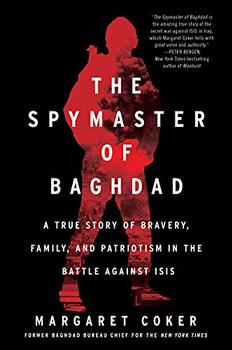Summary | Excerpt | Reading Guide | Reviews | Beyond the Book | Readalikes | Genres & Themes | Author Bio

A True Story of Bravery, Family, and Patriotism in the Battle against ISIS
by Margaret Coker
It didn't matter that Abu Harith wore a gleaming dishdasha, the traditional ankle-length loose shirt favored by Arab tribesmen, and a crisply starched headdress. His deeply creased face and wiry frame lacked authority in the venerable buildings of Baghdad University. He sat for six hours on a wooden bench outside the office of the president's secretary. He watched a river of people stream past him, in and out of the important man's workspace. No one paid him any attention. His desperation hung around him like vultures over a dying beast.
Finally his mortification was too much. On the long bus ride home, Abu Harith's sour mood curdled and hardened into a deep bitterness. He couldn't see beyond the red blanket of shame that was settling on his shoulders and covering his family. When he walked through the front door, Harith was sitting in the corner, nibbling cookies that his mother had made for him.
The mood at the al-Sudani home was raw and sharp, and years later the family never tired of sucking on the hollow bones of the argument that ensued.
Abu Harith threw his shoes at his son, his derision unbridled. I always said you were no better than a donkey, and look at you now, he yelled. Eating food, just like a beast. Waving your dick at school, just like a beast. Every breath you take disrespects me. I wish you had never been born.
Harith had spent twenty years meekly accepting his beatings, but that evening, he snapped. Harith jumped up and raised his own hand against his father.
Son of a whore. For once, would you just shut up?
Um Harith screamed and collapsed in a dead faint. Her other children rushed into the room, alarmed at the outburst. Harith froze. Instead of striking his father, he moved toward his prone mother, rolled her onto the cushions and checked to see if she was breathing. Several al-Sudani siblings burst into tears, wailing that their mother was dead.
Harith felt a new surge of anger at his father, this time for putting Um Harith's health at risk. Your tyranny will be the death of us, Harith told his father. As long as we die silently, with our honor intact, you won't care. From this day on, I refuse to listen to your orders. I will marry Nisreen, no matter what you say.
Abu Harith's face turned purple. Was his son possessed by a djinn? He wasn't a superstitious person, not like his wife, but at that moment he believed what she had told him the night they had learned Harith's news. The Kurdish girl must have cast a spell on their boy. If he had been in his right mind, none of this would have happened.
If you marry that witch you will be the cause of your mother's death, not me, Abu Harith shouted. If you do this, I will disown you. I swear by my father's honor. You will be dead to all of us.
Harith's adrenaline evaporated as suddenly as it had appeared. His sisters were sobbing, begging their mother to wake up. Harith knew, like his father did, that he could not survive without the family. He would have no job, no place to live, and nowhere else to turn. His father would ensure that the rest of the al-Sudanis would cut him off too. A new terrifying thought emerged as well. Nisreen might not even agree to be with him, a penniless young man from Saddam City. He hadn't seen her since learning he had failed his exams. What was it that her parents thought of him and his neighbors? That they were animals, like his father had just described him.
Harith stormed out of the house to the small front courtyard, desperate to find some space to contemplate the corner his father had trapped him in. Abu Harith had the upper hand in this match of wills—but his son didn't want to admit it just yet.
A moment later, the front door opened. Harith's younger brother Munaf walked out and stood next to him.
Mom is awake. She's drinking tea, he told Harith. Come back inside now. She's calling for you. Don't disappoint her. Munaf led Harith back into the family room, patting him on the back.
Excerpted from The Spymaster of Baghdad by Margaret Coker. Copyright © 2021 by Margaret Coker. Excerpted by permission of Dey Street Books. All rights reserved. No part of this excerpt may be reproduced or reprinted without permission in writing from the publisher.




The longest journey of any person is the journey inward
Click Here to find out who said this, as well as discovering other famous literary quotes!
Your guide toexceptional books
BookBrowse seeks out and recommends the best in contemporary fiction and nonfiction—books that not only engage and entertain but also deepen our understanding of ourselves and the world around us.